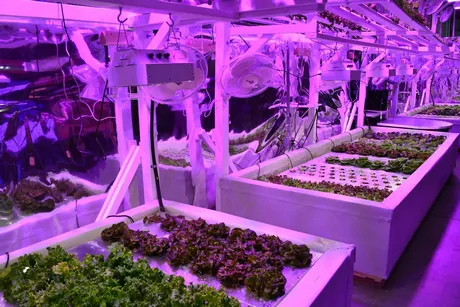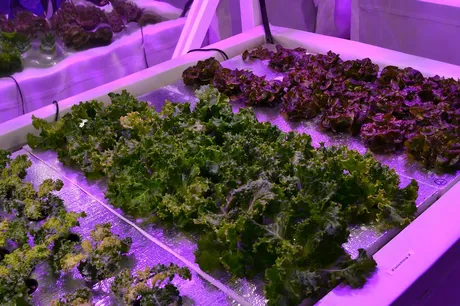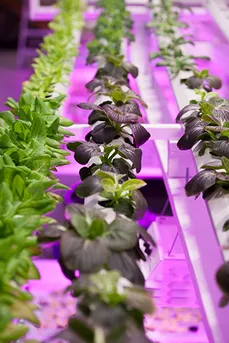Chris is CEO of UrbanHarvest, an innovative urban farming and services company based in downtown Seattle, WA, that has recently set up an indoor farm in conjunction with the Millionair Club Charity, an organisation that helps the homeless and unemployed get back on their feet and into work.

In a highly efficient 250 square feet of basement floor space, salad varieties are grown on two layers using a deep flow technique underneath and NFT on the upper level, with 100% artificial lighting supplied by the LED firm LumiGrow.
“We specifically decided to use LumiGrow LED lights in this case because we could get energy-efficiency rebates through our local electric utility,” said Chris.
In order to obtain rebates from the utility company, light fixtures must adhere to rigorous standards, and have the all-important LM-79 certification.
“I looked at other products, but LumiGrow lights are the only ones with the LM-79 certification.”
“That basically took every other LED lighting company out of the running right off the bat,” said Chris.

The Pacific Northwest has competitively priced electricity compared to the rest of the US and offers attractive incentives to businesses that implement high-efficiency technologies.
 Despite the small size of his operation, Chris is able to produce up to 800 salad plants per month, some of which are used in the freshly prepared meals provided onsite to patrons of the Millionair Club’s outreach services, and more recently they’ve begun selling to local high-end restaurants who will pay a premium for flavorful salad varieties grown organically and locally. The operation is on track to be self-sustaining this year.
Despite the small size of his operation, Chris is able to produce up to 800 salad plants per month, some of which are used in the freshly prepared meals provided onsite to patrons of the Millionair Club’s outreach services, and more recently they’ve begun selling to local high-end restaurants who will pay a premium for flavorful salad varieties grown organically and locally. The operation is on track to be self-sustaining this year.“The interesting thing about being a small producer is that I can’t compete on cost versus a very large farm in California so I wouldn’t grow iceberg or romaine lettuce because the price of those crops is so low – because they are produced in such large quantities.”
“So instead, we can produce fancy lettuces, basil, and other crops that have a higher price point so we can compete on product differentiation,” said Chris.
For more information:
Urban Harvest
Chris Bajuk (e-mail)
www.urbanharvest.com
LumiGrow
George Chan (e-mail)
www.lumigrow.com
